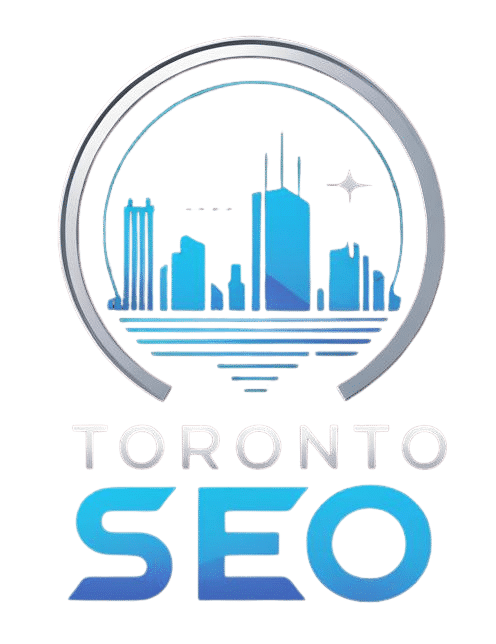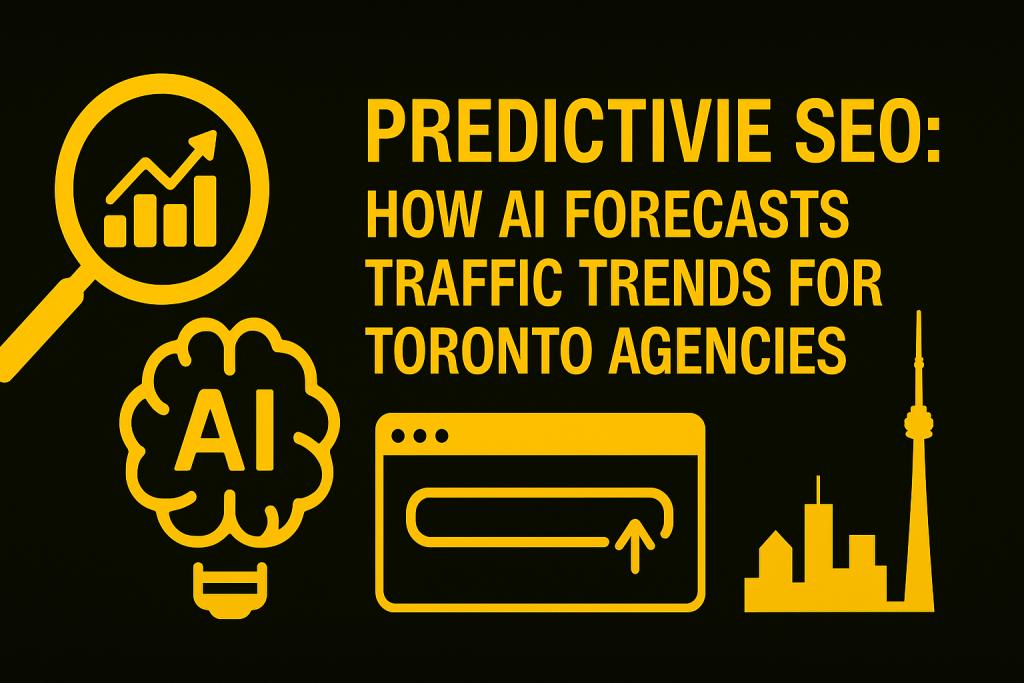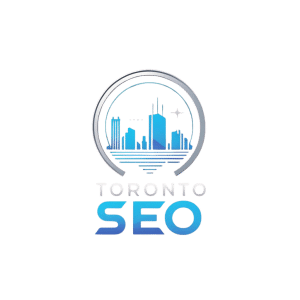Understanding the Power of Predictive SEO
Predictive SEO represents the next frontier for Toronto agencies looking to dominate organic search. By combining artificial intelligence (AI), big data analytics, and machine learning, agencies can now anticipate future traffic trends, user intent shifts, and even upcoming Google algorithm changes.
Unlike traditional SEO—which reacts to what already happened—predictive SEO foresees what’s next, enabling proactive optimization. For agencies in a competitive city like Toronto, this foresight provides a massive edge, helping clients capture emerging keywords before competitors even notice them.
How Predictive SEO Works: The AI Forecasting Model
At its core, predictive SEO leverages AI-driven algorithms trained on historical performance data—such as keyword fluctuations, CTR patterns, user behavior, and SERP volatility. These systems analyze millions of signals to forecast which keywords, pages, or topics will gain traction.
Key Predictive Components Include:
Machine Learning Models: Identify correlations between search volume, seasonal patterns, and content performance.
Natural Language Processing (NLP): Understands semantic search and user intent to predict future keyword clusters.
Behavioral Data Tracking: Monitors dwell time, bounce rates, and engagement to anticipate audience interests.
Search Engine Updates: Detects patterns in Google’s algorithm rollouts to adjust ranking strategies early.
Toronto agencies using AI forecasting tools have begun to see 15–30% faster growth in organic traffic compared to competitors relying on reactive strategies.
For more on this evolution, explore Top SEO Agencies in Toronto Using AI to Outrank the Competition.
Why Predictive SEO Is a Game-Changer for Toronto Businesses
1. Forecasting Keyword Trends Before They Peak
Predictive SEO allows agencies to spot emerging keyword opportunities before they reach mainstream popularity. AI models analyze search trend acceleration rates, similar to Google Trends data, but with deeper contextual understanding.
For instance, when “AI SEO Toronto” started trending, agencies equipped with predictive analytics were already optimizing for related subtopics such as “machine learning keyword targeting” and “AI content optimization.”
See how AI is reshaping keyword strategies in Toronto Marketing Agencies Using AI-Driven Keyword Clustering.
2. Reducing SEO Guesswork with Data-Backed Decisions
In traditional SEO, much of the work involves post-performance analysis—reacting to what’s already failed or succeeded. Predictive SEO flips this model by helping marketers plan content calendars, backlink strategies, and technical fixes months in advance.
For Toronto agencies managing multiple clients, this means more predictable results and higher client retention.
3. Adapting to Algorithm Changes Before They Hit
AI-driven predictive tools can detect patterns in Google’s algorithm updates months before they roll out publicly. For example, changes in semantic weight, entity recognition, and ranking volatility often indicate upcoming updates.
When Toronto agencies used predictive analysis before the 2024 Core Update, they safeguarded client sites with improved E-E-A-T, schema markup, and entity linking—long before penalties were applied.
You can learn more about staying ahead of Google updates in Understanding Google’s Latest Algorithm Update.
4. Building Smarter Content That Ages Well
Predictive content planning identifies evergreen opportunities and topic decay rates. Instead of publishing content that spikes and fades, Toronto SEO agencies are now producing content that stays relevant for years.
AI-powered predictive systems analyze topic lifecycles—spotting early-stage keywords, growth-phase trends, and decline patterns—allowing strategists to update or repurpose content at the right moment.
Real-World Application: Predictive SEO in Toronto Agencies
Content Optimization & User Behavior Forecasting
Agencies like TorontoSEO.com use AI to map content engagement curves—analyzing which articles are most likely to gain momentum. By forecasting organic engagement, they allocate resources to high-potential topics first.
Predictive modeling can even determine the optimal publishing time for blog posts, aligning with user search peaks in the Greater Toronto Area (GTA).
Link-Building and Citation Forecasting
Predictive SEO also applies to link-building campaigns. Instead of chasing existing link profiles, AI predicts which websites will gain domain authority over the next year—helping Toronto agencies secure backlinks that age like fine wine.
For a deeper look into smart link-building, explore How Toronto SEO Agencies Build High-Authority Backlinks Without Guest Posting.
Predicting Local SEO Fluctuations
AI-driven predictive tools can analyze geo-specific data across the GTA—forecasting Google Business Profile trends, citation consistency, and review sentiment.
For example, agencies can anticipate which neighborhoods (like North York or Scarborough) will show increased search activity for certain industries, allowing them to localize strategies faster.
Read more on the subject in Why More Toronto Businesses Are Turning to Local SEO in 2025.

AI Models and Tools Powering Predictive SEO
Modern predictive SEO relies on an ecosystem of AI-powered tools designed to extract, forecast, and interpret large-scale data patterns.
1. Predictive Analytics Platforms
Tools like Google BigQuery ML, Ahrefs’ Keyword Forecasting, and SEMRush Predictive Insights use regression models to forecast keyword performance, CTRs, and backlink growth.
2. Machine Learning Algorithms
These include time-series forecasting models like ARIMA, Prophet, and LSTM networks, which process years of SERP data to project traffic trends with precision.
3. Sentiment and Intent Analysis Engines
NLP-based systems classify queries into commercial, informational, navigational, or transactional intent, allowing agencies to align keyword clusters with user motivations.
4. Predictive Content Generators
Advanced AI tools now write data-backed content briefs that forecast optimal word count, subheadings, and internal linking patterns for maximum ranking potential.
You can learn how agencies combine such strategies in The Future of SEO in Toronto: Where Artificial Intelligence Meets Search Strategy.
Challenges in Implementing Predictive SEO
While predictive SEO offers groundbreaking potential, it also presents unique challenges that Toronto agencies must navigate carefully.
Data Volume and Quality
AI models rely on massive datasets, and incomplete or biased data can lead to inaccurate forecasts. Agencies must integrate diverse sources—Search Console, Analytics, CRM, and third-party APIs—to train reliable models.
Interpreting AI Insights
Even the most accurate forecasts are only useful if interpreted correctly. Human expertise remains crucial for strategic judgment, creativity, and contextual understanding—especially in markets as dynamic as Toronto.
Balancing Automation with Human Insight
Automation accelerates decisions but lacks nuance. Toronto agencies that blend AI prediction with human SEO expertise consistently achieve better long-term outcomes.
The Future of Predictive SEO for Toronto Agencies
The future of SEO will be defined by predictive intelligence. As search evolves into an AI-assisted discovery ecosystem, Toronto agencies must embrace real-time forecasting models to maintain visibility and authority.
Expect the rise of autonomous SEO systems—AI frameworks capable of automatically testing meta tags, predicting CTR improvements, and adjusting strategies without human input.
Agencies that adopt predictive SEO early will dominate Toronto’s hypercompetitive digital space.
To ensure your agency stays ahead, learn about AI SEO Services in Toronto and how machine learning is reshaping optimization.
External Resources for Predictive SEO Insights
For deeper technical understanding, agencies can explore:
These resources highlight the broader role of AI forecasting in data-driven decision-making across industries.
Conclusion: The Predictive Edge Toronto Agencies Need
Predictive SEO is more than a buzzword—it’s a strategic revolution. For Toronto agencies competing in a saturated market, predictive intelligence bridges the gap between reactive optimization and proactive growth.
By leveraging AI to forecast trends, anticipate algorithm changes, and guide keyword strategies, agencies can deliver consistent visibility, measurable ROI, and long-term client retention.
Ready to integrate predictive intelligence into your strategy?
Contact TorontoSEO.com today to future-proof your SEO campaigns.
FAQs
1. What is predictive SEO?
Predictive SEO uses artificial intelligence to forecast keyword, traffic, and ranking trends, enabling agencies to plan SEO campaigns in advance.
2. How does AI help forecast traffic trends?
AI models analyze historical search data, user intent, and engagement metrics to predict how specific keywords or topics will perform in the future.
3. Why is predictive SEO important for Toronto agencies?
Toronto’s competitive digital market requires proactive strategies. Predictive SEO helps agencies capture rising opportunities before competitors do.
4. Can predictive SEO replace traditional SEO?
No. Predictive SEO enhances traditional SEO—it’s a data-driven layer that helps strategists act on future trends instead of just reacting to past results.
5. How can businesses get started with predictive SEO?
Partner with an experienced AI-driven agency like TorontoSEO.com to integrate predictive analytics, keyword forecasting, and automated content planning into your campaigns.


